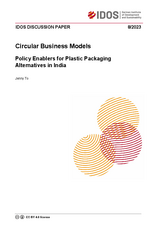Discussion Paper
Circular business models: policy enablers for plastic packaging alternatives in India
To, JennyDiscussion Paper (8/2023)
Bonn: German Institute of Development and Sustainability (IDOS)
ISBN: 978-3-96021-209-6
DOI: https://doi.org/10.23661/idp8.2023
Preis: 6 €
In recent years, global production of plastics has surged and is expected to increase further over the following years, with over a quarter being attributed to plastic packaging. Plastic packaging poses environmental risks due to the fossil fuels consumed in its production and the impact on eco-systems due to its inappropriate disposal. A large share of mismanaged plastic waste can be attributed to a few developing and emerging countries (DECs) in Asia. Their expected income and population growth, as well as associated increase in consumption and urbanisation, is expected to further strain inadequate waste management systems. In response, young ventures offering circular business models in packaging have emerged to tackle plastic packaging pollution. These ventures are embedded in an entrepreneurial ecosystem in which policies are, among others, determining enablers, and policy-makers have a key role in setting optimal framework conditions for circular business models in packaging to succeed. At the same time, policy agendas that address resource efficiency and the circular economy are on the rise in multiple DECs. For this reason, this paper addresses the question of the extent to which existing policies are supporting and enabling circular business models. This paper first discusses opportunities, risks, and challenges of existing circular business models in packaging in terms of waste hierarchy levels – reducing and dematerialising, reusing and refilling, replacing, and recycling – before examining the entrepreneurial ecosystems in which they operate. With a focus on policy as an enabler for circular business models in packaging, a holistic overview of possible policies in the circular packaging context is provided. Against this conceptual background, India is examined as a case-study. In recent years, multiple Indian start-ups have emerged, offering reusable packaging solutions or bio-based packaging alternatives, while other ventures seek to improve waste management and recycling. India’s previously introduced policies, including the Plastic Waste Management Rules, Swacch Bharat Mission, extended producer responsibility and a ban on single-use plastic, are the first stepping stones towards an enabling ecosystem for circular business models in packaging. However, this paper points out further opportunities – so far, India’s key policies have been addressing the downstream on the macro level. This study showed that macro-level policies need further enforcement and should be complemented by upstream policies. Meanwhile, meso-level and micro-level policies have been rather neglected. Policy-makers and development cooperation are encouraged to take action now, given the limited window of opportunity to establish a supporting framework for circular economies in development policy.
Kontakt
Cornelia Hornschild
Koordinatorin Publikationen
E-Mail Cornelia.Hornschild@idos-research.de
Telefon +49 (0)228 94927-135
Fax +49 (0)228 94927-130
Alexandra Fante
Bibliothekarin/Open Access-Koordinatorin
E-Mail Alexandra.Fante@idos-research.de
Telefon +49 (0)228 94927-321
Fax +49 (0)228 94927-130




